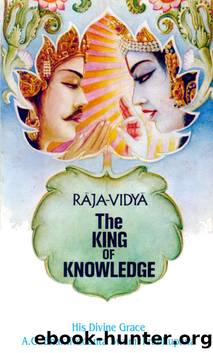Raja - Vidya: The King of Knowledge -- Prabhupada Books by A.C. Bhaktivedanta Swami Prabhupada

Author:A.C. Bhaktivedanta Swami Prabhupada [Prabhupada, A.C. Bhaktivedanta Swami]
Language: eng
Format: epub
Tags: Philosophy
Publisher: Prabhupada Living Archive
Published: 2010-12-08T13:30:00+00:00
Chapter Six
Knowledge of Ká¹á¹£á¹a's Appearances and Activities
There are two forces of nature working in us. By one we decide that in this lifetime we will make spiritual advancement, but at the next moment the other force, mÄyÄ, or illusory energy, says, "What is all this trouble that you're going to? Just enjoy this life and be easy with yourself." This tendency to fall into forgetfulness is the difference between God and man. Arjuna is a companion and associate of Ká¹á¹£á¹a's, and whenever Ká¹á¹£á¹a appears on any planet, Arjuna also takes birth and appears with Him. When Ká¹á¹£á¹a spoke Bhagavad-gÄ«tÄ to the sun god, Arjuna was also present with Him. But, being a finite living entity, Arjuna could not remember. Forgetfulness is the nature of the living entity. We cannot even remember what we were doing at this exact time yesterday or a week ago. If we cannot remember this, how is it possible to remember what happened in our previous lives? At this point we may ask how it is that Ká¹á¹£á¹a can remember and we cannot, and the answer is that Ká¹á¹£á¹a does not change His body.
ajo 'pi sann avyayÄtmÄ
bhÅ«tÄnÄm Ä«Åvaro 'pi san
praká¹tiá¹ svÄm adhiá¹£á¹hÄya
sambhavÄmy Ätma-mÄyayÄ
"Although I am unborn and My transcendental body never deteriorates, and although I am the Lord of all sentient beings, I still appear in every millennium in My original transcendental form." (Bg. 4.6)
The word Ätma-mÄyayÄ means that Ká¹á¹£á¹a descends as He is. He does not change His body, but we, as conditioned souls, change ours, and because of this we forget. Ká¹á¹£á¹a knows not only the past, present and future of His activities, but the past, present and future of everyone's activities.
vedÄhaá¹ samatÄ«tÄni
vartamÄnÄni cÄrjuna
bhaviá¹£yÄá¹i ca bhÅ«tÄni
mÄá¹ tu veda na kaÅcana
"O Arjuna, as the Supreme Personality of Godhead, I know everything that has happened in the past, all that is happening in the present, and all things that are yet to come. I also know all living entities; but Me no one knows." (Bg. 7.26)
In ÅrÄ«mad-BhÄgavatam we also find that the Supreme Lord is defined as one who knows everything. This is not the case with even the most elevated living entities, such as BrahmÄ and Åiva. Only Viá¹£á¹u or Ká¹á¹£á¹a knows everything. We may also ask that if the Lord does not change His body, why does He come as an incarnation? There is much difference among philosophers concerning this question. Some say that Ká¹á¹£á¹a assumes a material body when He comes, but this is not the case. If He assumed a material body like ours, He could not remember, for forgetfulness is due to the material body. The actual conclusion is that He doesn't change His body. God is called all-powerful, and in the verse quoted above, His omnipotence is explained. Ká¹á¹£á¹a has no birth, and He is eternal. Similarly, the living entity has no birth, and he is also eternal. It is only the body with which the living entity identifies that takes birth.
In the very beginning of Bhagavad-gÄ«tÄ, in the Second
Download
This site does not store any files on its server. We only index and link to content provided by other sites. Please contact the content providers to delete copyright contents if any and email us, we'll remove relevant links or contents immediately.
Getting It, Then Getting Along by L. Reynolds Andiric(655)
Religion and Politics Beyond the Culture Wars : New Directions in a Divided America by Darren Dochuk(575)
Global Justice, Christology and Christian Ethics by Lisa Sowle Cahill(429)
Positive Psychology in Christian Perspective: Foundations, Concepts, and Applications by Charles Hackney(355)
Forgiveness and Christian Ethics by Unknown(350)
Douglas Hamp The First Six Days by Unknown(297)
The Horrors and Absurdities of Religion by Arthur Schopenhauer(271)
Insurgency, Counter-insurgency and Policing in Centre-West Mexico, 1926-1929 by Mark Lawrence(267)
Middle Eastern Minorities: The Impact of the Arab Spring by Ibrahim Zabad(250)
Christian Martyrdom and Christian Violence by Matthew D. Lundberg;(244)
Beyond Heaven and Earth by Gabriel Levy(238)
The Oxford Handbook of Greek and Roman Mythography by R. Scott Smith;Stephen M. Trzaskoma;(235)
God and Eros by Patterson Colin;Sweeney Conor;(231)
The Bloomsbury Reader in Christian-Muslim Relations, 600-1500 by David Thomas;(225)
Autobiography, Volume 2: 1937-1960, Exile's Odyssey by Mircea Eliade(216)
Cult Trip by Anke Richter(212)
Witches: the history of a persecution by Nigel Cawthorne(211)
An Introduction to Kierkegaard by Peter Vardy(202)
The Global Repositioning of Japanese Religions by Ugo Dessi(196)
